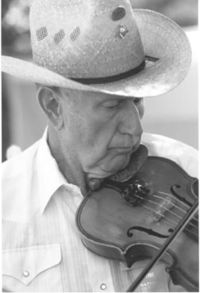Biography:Jim Herd
Jim Herd
| |
|---|---|
| Given name: | Bert |
| Middle name: | James |
| Family name: | Herd |
| Place of birth: | Tancy County, Missouri |
| Place of death: | Sunnyside, Washington |
| Year of birth: | 1919 |
| Year of death: | 2002 |
| Profile: | Musician |
| Source of information: | Vivian Williams |
Biographical notes
This is Jim Herd's autobiography as excerpted from a 1987 interview by Kathleen Oyen for the Washington Traditional Fiddlers Project.
"I was born and raised in the Ozark Mountains in southern Missouri, Tancy County. I’m the youngest of a fiddling family, and the fiddling in my family goes back to my great grandfather, maybe farther, I don’t know. He was born in 1789, and I still play some of the tunes that have been handed on down from father to son, now to the fourth generation. And the tunes that I play, I learned them from my father and my older brothers, we all played. It was something we was supposed to do, I guess. We never any of us, ever once went to a music school. I don’t know anything about notes, I don’t know one note from another. I play strictly by ear. I have played since I can remember, I don’t really know when I started. It’s been part of my life all along.
"I guess I play a Tennessee style, ‘cause that’s what my father played. And we always used banjos. My father came from Sneedville, Tennessee, that’s down right near Cumberland Gap. Everyone of the old timers in the community where I was raised, they were all from three states: either Kentucky, Tennessee, or Virginia. My people, when they came from England, they settled shortly after they come to this country, they settled in Tennessee. My mother’s people came from Ireland, father’s people from England, and they were all from Tennessee originally, when they come into Missouri.
"They danced a lot of square dances there. You’d play maybe all night, and they’d dance a very few waltzes, or two-steps or something like that. It was strictly breakdown tunes, and fast dancing.
"The old time jig dance was done down there, and it originated in Tennessee, Kentucky, and some of those states back there. Dad said that back in Tennessee when they’d have a fiddle contest they’d always have a jig dance contest, and we did that in the Ozarks too. And you played a breakdown like I play here now and they jig danced. They called it jig dancing or buck dancing. It was practically the same step that the cloggers do today. And they always give prizes for the best jig dancer. All that stuff made a big change in the last forty-fifty years.
"I play a lot of the old time square dance tunes they played back when my grandfather was a young man. My grandfather Herd was a Union soldier. He carried his fiddle all through the Civil War, and played around campfires. It’s been handed on down from one generation to another, and that’s why I know that the style I play today was the style that they played back them days, because it was handed down from father to son, down to me. It’s a lot of the same tunes, and the same style that they played back then. That’s why I know it’s particularly old time style fiddling."
